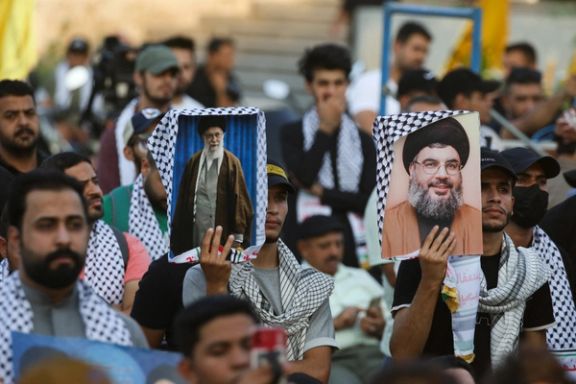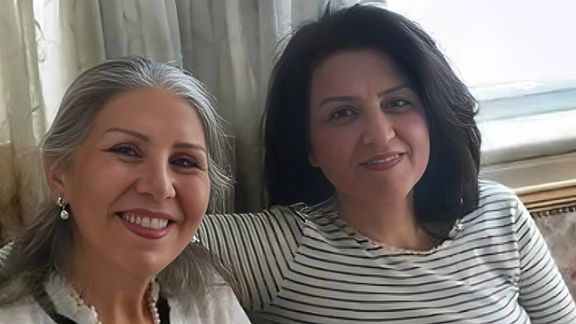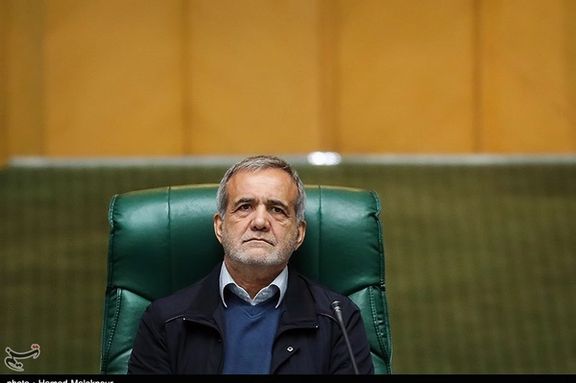US Decries Iran’s Mock Execution And Torture Of Prisoners

Washington has called on the Islamic Republic to stop torture, mock execution and issuing death sentences without fair trial for prisoners.

Washington has called on the Islamic Republic to stop torture, mock execution and issuing death sentences without fair trial for prisoners.
In a statement issued Tuesday via the Farsi account of the US State Department on the social media platform X, the United States called on the Islamic Republic to cease the practice.
The State Department utilized the hashtag #SamanYasin in expressing deep concerns over the wellbeing of the imprisoned Iranian rap artist.
Saman Seydi, widely recognized by his stage name Saman Yasin, was arrested in October 2022 during anti-regime protests in Iran and was initially handed a death sentence. However, the sentence was later overturned by the Supreme Court.
Ahmadreza Haeri, a political prisoner held in Qezel Hesar Prison, revealed in a letter on Monday that Yasin had recounted a disturbing incident from December of the previous year. According to Yasin, Evin Prison officials took him out of his ward at three in the morning, stating, "If you have a will, write it."
Reportedly, Yasin was taken to the gallows with his hands tied and eyes blindfolded, where officials discussed tying the noose off-center to ensure a swift and less agonizing death.
In a turn of events, officials informed Yasin, after a phone call, that he was being given another chance for "cooperation," leading to the abandonment of his execution.
In response to the reports, the US Department of State emphasized, "The use of fabricated execution, torture, and issuing death sentences without a fair trial not only violates human rights but is also contrary to fundamental respect for human dignity."
The US called on the regime to "immediately cease such inhumane actions and conduct fair and transparent trials for their citizens."
In May alone, a record 142 prisoners were excited as the surge continues. In July, Iran Human Rights Organization reported at least 354 executions had taken place this year.

After weeks of drone and rocket attacks against US troops in Iraq and Syria, the United States carried out a series of strikes in Iraq against Iranian-backed militants.
Until this week, the United States had been reluctant to retaliate in Iraq because of the delicate political situation there. It retaliated only in Syria launching three strikes in October and November.
Iraqi Prime Minister Mohammed Shia Al-Sudani has limited control over the Iranian-backed militias, whose support he needed to win power a year ago and who now form a powerful bloc in his governing coalition.
The strike on Tuesday evening targeted two facilities in Iraq, the US military said in a statement.
"The strikes were in direct response to the attacks against US and Coalition forces by Iran and Iran-backed groups," the statement said.
The strike by fighter aircraft targeted and destroyed a Kataeb Hezbollah operations center and a Kataeb Hezbollah Command and Control node near Al Anbar and Jurf al Saqr, south of Baghdad, a US defense official said, speaking on condition of anonymity.
Kataib Hezbollah paramilitary group said five of its members were killed in the strikes in the Jurf al-Sakhar area south of Baghdad, in a statement posted on social media on Wednesday.
Iraq's Kataeb Hezbollah militia is a powerful armed faction supported by Iran's Quds Force, the extraterritorial branch of the Revolutionary Guard.
The official said there were Kataeb Hezbollah personnel present, but an assessment was ongoing about casualties.
Iran has so far avoided direct involvement in the Gaza war, but its proxy forces across the region, including from Lebanon and Yemen, have launched attacks against Israel and US forces.
About 24 hours earlier, US forces were attacked at an air base west of Baghdad and a US military AC-130 aircraft responded in self-defense, killing several Iranian-backed militants, US officials said.
Ain al-Asad air base was attacked by a close-range ballistic missile that resulted in eight injuries and minor damage to infrastructure, two US officials said.
The United States had so far limited its response to the 66 attacks against its forces in Iraq and neighboring Syria, claimed by Iran-aligned Iraqi militia groups, to three separate sets of strikes in Syria.
At least 62 US personnel have suffered minor injuries or traumatic brain injuries in the attacks.
Republicans and others criticized the Biden administration for its lack of determination to respond more forcefully against Iranian proxies. Even Pentagon officials in recent days began to talk to the media about their frustration over lack of deterrence. The Washington Post reported that US Department of Defense chiefs were frustrated by lack of action in dealing with Iran-backed attacks.
“Are we trying to deter future Iranian attacks like this,” a Pentagon official told the Washington Post on the condition of anonymity. “There’s no clear definition of what we are trying to deter.”
The attacks against US targets have ended a year-long unilateral truce that Iranian proxy groups in Iraq observed, as Tehran was negotiating the release of its frozen funds in Iraqi and South Korean banks. The US agreed earlier this year to unblock around $17 billion, followed by the Hamas terror attack on Israel. The militias then resumed their drone and rocket strikes against US bases, saying it was in retaliation for US support for Israel.
The United States has 900 troops in Syria and 2,500 in Iraq on a mission it says aims to advise and assist local forces trying to prevent a resurgence of Islamic State, which in 2014 seized large swaths of both countries before being defeated.

A former leader of the Iranian Baha’i community says the Islamic Republic gives them no chance of “leading a normal life” on account of their faith.
“For forty-five years, we Baha’is have been constantly disqualified from leading a normal life in our ancestral homeland,” Mahvash Sabet, a former member of the Baha’i community’s leadership group wrote in a letter from Tehran’s Evin Prison.
She reflected on the impact of the Islamic Revolution of 1979, stating, "Our ancestral homeland was abruptly taken from us, and we became 'the others'." Sabet recounted the misfortunes suffered by the Baha’i community, including the execution of nearly 250 of its members and the confiscation of assets belonging to many others.
The Shia clergy consider the Baha’i faith as a heretical sect. With approximately 300,000 adherents in Iran, Baha’is face systematic persecution, discrimination, and harassment. They are barred from public sector employment and, in certain instances, have been terminated from private sector jobs due to pressure from authorities.
The Constitution of the Islamic Republic recognizes only Islam, Christianity, Judaism and Zoroastrianism. Supreme Leader Ali Khamenei has on several occasions called the Baha'i faith a cult and in a religious fatwa in 2018 forbade contact, including business dealings, with its followers.

In her letter, a copy of which was received by Iran International, Sabet has used the term “disqualified” (radd-e salahiyat) to describe Iranian Baha’is deprivation of civil and human rights including freedom of religion, the right to higher education, and most jobs.
In the context of ideological screening primarily carried out by security and intelligence bodies, Radd-e salahiyat means “found disqualified” for a position or status. Screening is conducted in a wide range of situations including higher education, civil service, participation in national sports teams, and elections.
Belief in the absolute guardianship and rule of a jurisprudent cleric (velayat-e motlaqqeh-ye faqih) and the Constitution of the Islamic Republic as a governing system are two of the fundamental requirements for being “qualified” in these situations.
Sabet, now seventy-one, was dismissed from her job as a school principal after the Islamic Revolution of 1979. She has been consistently denied the opportunity to publish her poetry in Iran, where books undergo scrutiny and rejection not solely based on their content, but often due to the authors' ideology, religion, or private lives.
In her letter, Sabet, who has spent nearly twelve years in prison for her faith, reveals that authorities appropriated a sand processing factory her husband had been constructing just a week before its launch. “He was disqualified, too!” she wrote in her letter.
In 2009, seven leaders of the Baha’i community, collectively known as Yaran (friends or helpers), including Sabet, were arrested. They were sentenced by a revolutionary court to 20 years in prison on fabricated charges, including "insulting" Islamic sanctities, propaganda against the regime, and alleged spying for Israel, for which the prosecutor had sought death sentences.
Some of the charges, including espionage, were dropped by an appeal court in 2010, resulting in a reduction of their sentences to 10 years. However, authorities reinstated the original 20-year sentences in 2011.
All members of the Yaran group were released from prison between September 2017 and December 2018. However, Sabet and Fariba Kamalabadi, another female member of the group, were arrested again on August 1, 2022.
Both women endured months of solitary confinement while awaiting their trial. In December, they were handed another decade-long prison term for "forming a group to act against national security," a sentence they are currently serving.

Iranian MP Masoud Pezeshkian says while the world moves towards AI, Iran is regressing amid widening internet crackdowns.
Pezeshkian warned about the potential consequences of insisting on such restrictions, stating, "If we continue in this way, in the not-too-distant future, we will create a country that will have a significant gap with the advanced world. We always focus on the wrong uses of the internet, while we should not deprive good individuals because of the wrongdoings of some."
Internet restrictions in Iran have gradually increased since President Ebrahim Raisi assumed office in 2021. Although initiated during the previous governments, the measures have gained renewed momentum under the current administration, ramped up further since the Women, LIfe, Freedom movement began last year.
The representative of Tabriz underscored that society should not suffer due to the undesirable actions of a few individuals. He argued, "People use the internet in various ways, and the restrictions only increase the concerns and frustrations of the people. Instead, we should always embrace innovations and strive to be pioneers."
Iran has a history of imposing strict censorship measures on internet access over the past two decades, limiting citizens' access to free information. This includes the blocking of numerous foreign and domestic websites, including reputable news outlets. Despite the restrictions, many Iranians have been using Virtual Private Networks (VPNs) and anti-filtering software to circumvent these limitations.
Major social media platforms such as Instagram, Facebook, YouTube, WhatsApp, X, and Telegram remain inaccessible without the use of anti-filtering software and VPNs.

White House spokesman John Kirby said on Tuesday that Iran may be considering to provide Russia with ballistic missiles for use in Ukraine.
He further stated that the United States would monitor the situation between Iran and Russia and take appropriate action as needed.
Iran has already provided Russia with armed drones, guided aerial bombs and artillery shells, the Wall Street Journal cited US officials as saying on Tuesday.
The WSJ report said Washington’s concern about the expanding military cooperation between Iran and Russia grew when Iran showed its Ababil and Fateh-110 missiles to Russian Defense Minister Sergei Shoigu when he visited Tehran in September.
“We are therefore concerned that Iran is considering providing Russia with ballistic missiles for use in Ukraine,” a spokesman for the National Security Council said.
In October, when UN sanctions on Iran's missile program expired, Russia announced plans to deepen military ties with Tehran. "Now, after the expiration of some restrictive provisions of resolution 2231, there are fewer such restrictive regimes. Naturally, we will be using this, and it should not raise any questions for anyone,” Russia's Deputy Foreign Minister Sergei Ryabkov said.
Tehran has denied allegations of sending armed drones to Russia during Moscow's invasion of Ukraine. The Iranian government stated that any such shipments, if they did occured, took place before the war.
Nevertheless, Russia's utilization of Iranian-made drones for attacks on Ukrainian infrastructure and civilian targets has drawn international criticism. Western powers have raised concerns over Iran's involvement in arming Russia, along with the possibility of supplying additional weaponry and ammunition.

Following the furore over students being allowed to attend a graduation ceremony without mandatory hijab, the dean of Iran’s Sharif University has been fired.
Mohammad Ali Zolfigol, the Minister of Science, issued a decree removing Rasoul Jalili from his position and introduced Abbas Mousavi as the new acting head of the university.
The graduation ceremony for 81 students from the international campus of Sharif University of Technology took place on Kish Island last Thursday. According to videos shared on social media, many female graduates were seen without mandatory hijab, wearing graduation uniforms.
Following that, the chancellor of Kish campus was dismissed. On Saturday, the AmirKabir Telegram channel reported that, following threats from the ministries of science and intelligence, Ali Selk Ghaffari, the chancellor of Kish campus, had been "forced to resign."
The dismissal will come as a shock for many, knowing Jalili as a key figure in the Khamenei inner circle. In 2012, Jalili was appointed as a member of the Supreme Council of Cyberspace by the decree of Supreme Leader and was previously named as one of the organizers of "digital suppression," leading to his inclusion in the US sanctions list.
Since the protests following the death of Mahsa Amini in morality police detention, many students, especially female ones, have openly and practically opposed mandatory hijab. As dissent deepens, universities have stepped up security and surveillance, in line with that seen across public spaces in Iran.